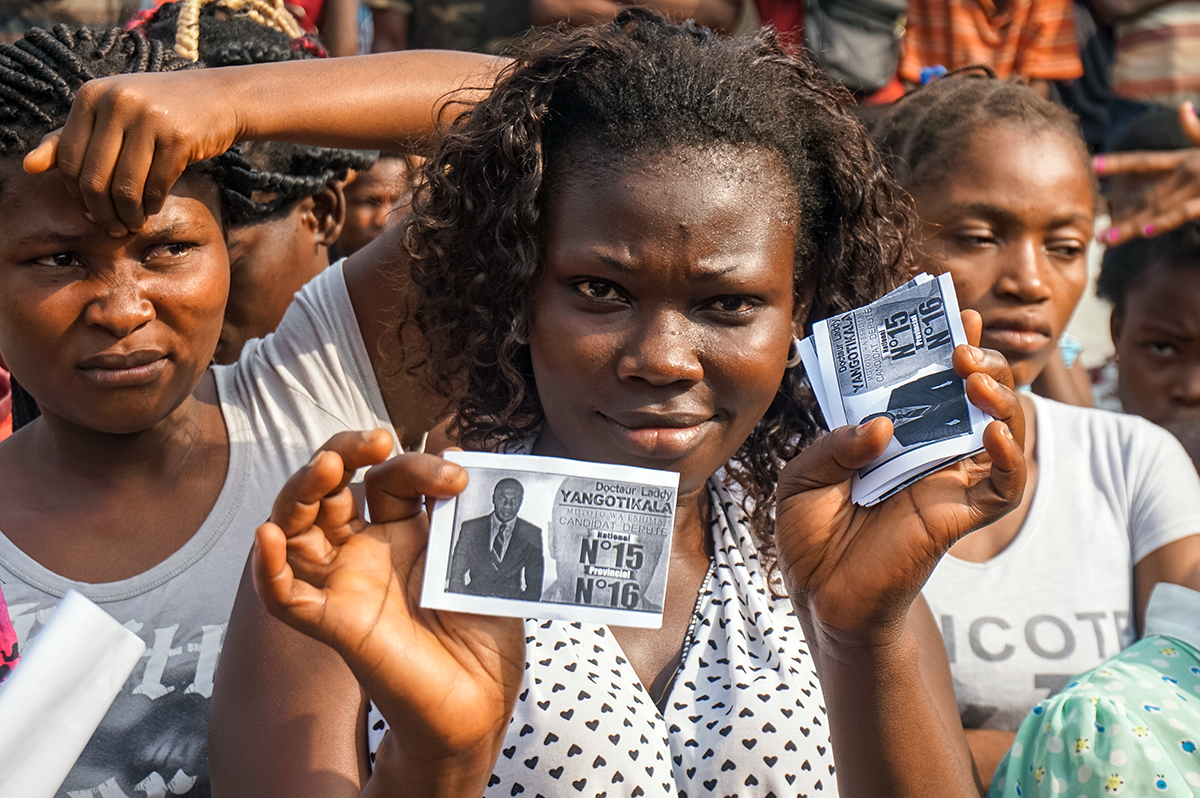
Nadia Kanyere Karasisi, GPJ DRC
Carine Mayaza holds a flyer for Laddy Yangotikala, who ran for public office in Kisangani, a major city in Democratic Republic of Congo. Young candidates are increasingly vying to become elected officials because such a job would result in a guaranteed income in a country where jobs are hard to find.
KISANGANI, DEMOCRATIC REPUBLIC OF CONGO — Laddy Yangotikala graduated from medical school, but he doesn’t want to be a doctor.
His true aspiration? Politics.
His motivation? Money.
“Politics has become the best-paying job in the Democratic Republic of Congo in general and the city of Kisangani in particular,” Yangotikala, a 32-year-old father of one, says.
Yangotikala is among a wave of younger people taking an active role in politics.
Christophe Limanga Nkolya, an Electoral Commission officer at Commission Électorale Nationale Indépendante, DRC’s elections authority, told GPJ that nearly 70% of young graduates in Kisangani end up joining one of two major political parties – the Parti du Peuple pour la Reconstruction et la Démocratie, or the Mouvement de Libération du Congo.
In December’s national elections, Limanga says nearly 80% of those taking part in national and provincial races were young people.



The city of Kisangani has a vibrant higher education sector that includes public universities such as the University of Kisangani and the Faculty Institute of Agricultural Sciences of Yangambi, as well as six private universities.
Each year, thousands of young people graduate from these institutions and storm the labor market. But unemployment is high here, so many have their dreams of working in their chosen profession dashed.
According to one estimate, more than half of the country’s urban population is jobless. (Read our story about how some Congolese in Kisangani are gambling to deal with unemployment here.)
As a stopgap solution, some people start small businesses. Others fail to get funds for their startups, and spend their days looking for work or taking on a string of odd jobs.
And for some, a job in politics is a dream gig, but not necessarily for the right reasons.
“All I can say is that many young grads’ move to get into politics isn’t something born out of passion, but instead is the result of unemployment,” says Célestin Kangakolo, a former politician and colleague of DRC’s first post-independence prime minister, Patrice Lumumba.
The political landscape is now dominated by immature politicians, he says, adding that he’s lost hope in the ability of Kisangani’s political class to serve the nation.
“We’re duty-bound to mentor this rising generation of politicians in the city of Kisangani in order for the old martyred city to integrate itself in the nation’s political landscape,” he says.
Antoinette Sakina, on the other hand, another famous political activist in the city of Kisangani, supports young graduates’ participation in politics.
“We now have to rejuvenate our politics and integrate young people, because they’re the ones who still have enough strength to serve the nation,” she says.
But Casimir Ngumbi, a professor at the University of Kisangani’s faculty of social, administrative and political sciences, says new graduates wind up comparing their lives with those of people who are in politics and have “accumulated wealth.”
Across the board, government officials are known to enrich themselves based on their positions of power. This kind of corruption is endemic in DRC.
“When the government fails to create jobs for its people, this is the result,” Ngumbi says, referring to the administration of former president Joseph Kabila.
Yangotikala ran for the elected office of provincial deputy in Kisangani, but he lost the race.
Now, he says he’ll have to return to his initial career path in medicine.
If doctors’ wages were adequate, he says, he wouldn’t have to envy politicians.
“I have to continue in my professions as a doctor, because there’s no transparency in Congo’s politics,” he says.
Ndahayo Sylvestre, GPJ, translated the article from French.







